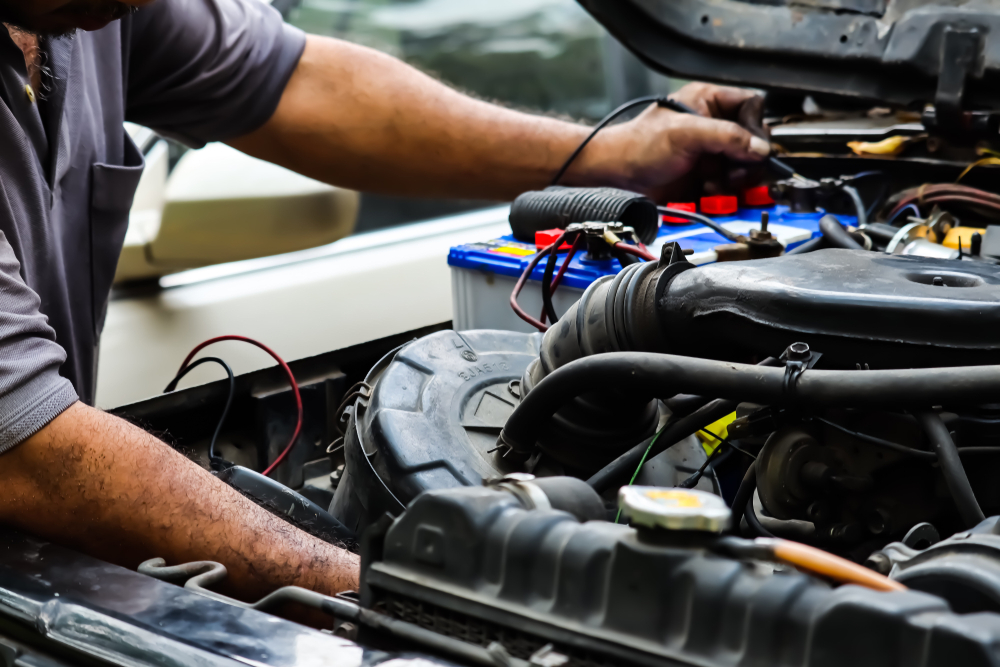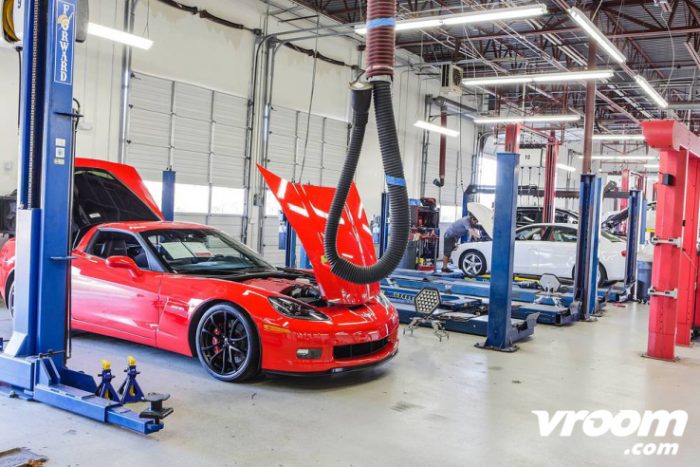Now Reading: How to Pay for Car Repairs in Installments
-
01
How to Pay for Car Repairs in Installments
How to Pay for Car Repairs in Installments

To pay for car repairs in installments, you can consider the following options:
- In-house financing: Some auto repair shops offer in-house financing programs that allow you to pay for the repairs in installments over a set period. Check with your local repair shop to see if they provide such a service and inquire about their terms and conditions.
- Personal loans: Apply for a personal loan from a bank, credit union, or online lender. These loans typically come with fixed interest rates and monthly payments spread over a specific term. Be sure to compare different lenders to find the best loan terms and rates for your situation.
- Credit cards: If you have a credit card with a sufficient credit limit, you can use it to pay for car repairs and then make monthly payments to pay off the balance. Some credit cards offer interest-free periods, but be aware of the interest rates after this period and any potential fees.
- Buy now, pay later (BNPL) services: Some auto repair shops may partner with BNPL providers like Affirm, Klarna, or Afterpay, allowing you to split the repair cost into smaller, interest-free installments over a few weeks or months.
- Completely Online Title Loans in Minutes: If you own a vehicle with a clear title, you can apply for a title loan using your car as collateral. This option should be considered as a last resort due to the high interest rates and potential risks involved, such as repossession if you cannot repay the loan.
Before opting for any financing option, carefully evaluate the terms, interest rates, and fees associated with each choice. Always choose a solution that fits your budget and financial situation to avoid further complications.
Which Type of Financing to Choose?
Compare the amounts, terms, rates, fees, and other criteria of car title loans, payday loans, personal loans, credit cards, and in-house financing used for car repairs
| Loan Type | Amounts | Terms | Rates | Fees | Other Criteria |
|---|---|---|---|---|---|
| Car Title Loans | $100 to $50,000 | 15 days to 3 years | 25% to 300% APR | Origination, late, repossession fees | Based on vehicle’s value, high risk, collateral (vehicle) required, quick approval and funding |
| Payday Loans | $100 to $1,000 | 2 weeks to 1 month | 200% to 500% APR | Origination, late, rollover fees | Short-term, unsecured, high interest, next paycheck serves as collateral, fast approval |
| Personal Loans | $1,000 to $50,000 | 1 to 7 years | 4% to 36% APR | Origination, late, prepayment fees | Unsecured or secured, good credit usually required, flexible use, competitive interest rates with good credit |
| Credit Cards | Varies by limit | Revolving credit | 13% to 25% APR (average) | Annual, late, over-limit, cash advance | Interest-free grace period, minimum monthly payments, rewards, credit score requirements |
| In-house Financing (Car Repairs) | Varies by mechanic | Case-by-case basis | Varies by mechanic | Late or missed payment fees | Flexible payment plans, subject to approval, offered by the repair shop, may require credit check |
Please note that the amounts, terms, rates, and fees mentioned in the table can vary depending on the lender, your location, and your credit profile. Always compare different financing options and choose the one that best suits your needs and financial situation.
How to Find the Best Car Repair Financing Type?
When deciding which car repair loan option to choose, consider the following factors:
- Loan amount: Evaluate the total cost of the car repairs and choose a financing option that covers the required amount. Different loan types have varying maximum and minimum loan amounts.
- Interest rates: Compare interest rates across various financing options. Lower interest rates will result in lower overall costs for the loan.
- Repayment terms: Assess your ability to repay the loan within the specified time frame. Longer repayment terms usually result in lower monthly payments but may have higher overall interest costs. Shorter terms often have higher monthly payments but lower total interest costs.
- Fees: Be aware of any associated fees, such as origination, late, prepayment, or annual fees, which can add to the total cost of the loan.
- Credit requirements: Some financing options, like personal loans and credit cards, may require a good credit score. If your credit is less than perfect, consider alternatives like in-house financing or payday loans, which may have more lenient credit requirements.
- Speed of funding: If you need the funds urgently, consider options with faster approval and funding processes, such as payday loans or car title loans. Personal loans and credit cards may take longer to approve and fund.
- Collateral requirements: Evaluate whether you’re comfortable using your vehicle or another asset as collateral. Car title loans and some personal loans require collateral, while payday loans, credit cards, and in-house financing are typically unsecured.
- Flexibility: Consider the flexibility of the loan option, such as the ability to use the funds for various purposes, repayment plan adjustments, or the option to repay the loan early without penalties.
Weigh these factors against your financial situation and needs to determine the most suitable financing option for your car repairs. Additionally, it’s always a good idea to compare multiple lenders and loan products to ensure you’re getting the best deal possible.
What happens if you can’t afford to pay your mechanic?
If you find yourself unable to afford the payment for your mechanic, consider taking the following steps:
- Communicate with the mechanic: As soon as you realize you’re unable to pay, inform your mechanic about your financial situation. They may be understanding and willing to work out a payment plan or offer a discount on the repair costs.
- Negotiate the costs: Discuss the repair bill with the mechanic and see if there’s any room for negotiation. Sometimes, they may be willing to lower the price or prioritize essential repairs, allowing you to spread out the cost over time.
- Seek alternative financing: Explore different financing options, such as personal loans, credit cards, or buy now, pay later services, to cover the repair costs. Make sure to carefully assess the terms and interest rates to avoid worsening your financial situation.
- Get a second opinion: If the repair costs seem unusually high, consider getting a second opinion from another mechanic. They may provide a more affordable solution or identify less critical repairs that can be postponed.
- DIY repairs: For minor repairs or maintenance tasks, you could attempt to do the work yourself if you have the necessary skills and tools. However, be cautious not to attempt repairs beyond your capabilities, as it could lead to further damage and expenses.
If you still cannot pay your mechanic after exploring these options, be aware that they have the legal right to hold your vehicle (mechanic’s lien) until the debt is settled. This means they may keep your vehicle at their shop and charge storage fees, or, in some cases, sell the vehicle to recoup their costs. To avoid such consequences, it’s crucial to maintain open communication with the mechanic and explore all available options to cover the repair costs.
Summary
Car repair loans paid in installments provide a convenient way for borrowers to finance vehicle repairs and spread the cost over a fixed period. These loans come in various forms, such as personal loans, credit cards, in-house financing, car title loans, and payday loans. When choosing the most suitable option, consider factors like loan amounts, interest rates, repayment terms, fees, credit requirements, speed of funding, collateral requirements, and flexibility. Comparing multiple lenders and loan products can help you find the best financing solution to fit your financial situation and car repair needs.
Stay Informed With the Latest & Most Important News
Previous Post
Next Post
-
 01Polestar Boss Says It’s Time To Outrun BMW M And Mercedes-AMG
01Polestar Boss Says It’s Time To Outrun BMW M And Mercedes-AMG -
 02Spy Shots: 2027 Mitsubishi Pajero Spotted in Testing Ahead of Possible U.S. Return
02Spy Shots: 2027 Mitsubishi Pajero Spotted in Testing Ahead of Possible U.S. Return -
 032026 Toyota Hilux EV: A Powerful Truck with Silent Torque
032026 Toyota Hilux EV: A Powerful Truck with Silent Torque -
![2027 Mercedes-Benz S-Class Debuts with V8 Engine [Photo Gallery]](https://speedlux.com/wp-content/uploads/2026/01/2027-Mercedes-Benz-S-Class-33-155x125.jpg) 042027 Mercedes-Benz S-Class Debuts with V8 Engine [Photo Gallery]
042027 Mercedes-Benz S-Class Debuts with V8 Engine [Photo Gallery] -
 05Spy Photos: VW ID. Polo GTI Goes Electric with 223 HP and 280 Miles of Range
05Spy Photos: VW ID. Polo GTI Goes Electric with 223 HP and 280 Miles of Range -
 062026 Corvette ZR1 Production Surges Past Expectations as Output Clears 1,000 Units
062026 Corvette ZR1 Production Surges Past Expectations as Output Clears 1,000 Units -
 07Hyundai Palisade’s Breakout Year Shows How Quickly the Market Can Turn
07Hyundai Palisade’s Breakout Year Shows How Quickly the Market Can Turn



![2027 Mercedes-Benz S-Class Debuts with V8 Engine [Photo Gallery]](https://speedlux.com/wp-content/uploads/2026/01/2027-Mercedes-Benz-S-Class-33-700x394.jpg)









































